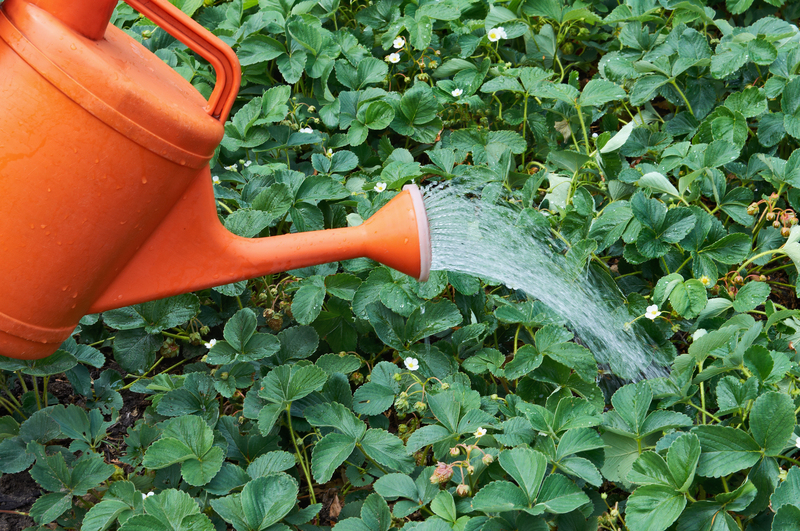Nurturing Our Planet: Gardening's Climate Benefits
Posted on 02/06/2025
Nurturing Our Planet: Gardening's Climate Benefits
In an era marked by environmental challenges and rising concerns over climate change, every green action counts. One of the most accessible and effective ways individuals can contribute to planetary well-being is through gardening. Whether on a plot of land, a balcony, or even windowsill planters, nurturing plants goes far beyond aesthetics, offering significant environmental advantages. This comprehensive article explores gardening's climate benefits, its role in nurturing our planet, and practical ways to deepen your green impact.
An Introduction to Gardening for the Climate
Gardening is more than a hobby--it's a climate-acting solution available to almost everyone. As urbanization increases and natural landscapes shrink, every patch of cultivated greenery becomes a vital ecological asset. Through climate-smart gardening practices, we can mitigate greenhouse gas emissions, support biodiversity, and restore vital ecosystems.
Why Gardening Matters in the Fight Against Climate Change
- Gardens sequester carbon--plants remove CO2 from the air during photosynthesis, storing it in their structures and the soil.
- Gardening sustains biodiversity by offering habitat and food for pollinators, birds, and beneficial insects.
- Soil health is improved through organic gardening, enhancing its ability to retain carbon.
- Local food production reduces emissions tied to long-distance transportation of groceries.
- Gardens moderate microclimates, cooling the surroundings and reducing urban heat islands.
Capturing Carbon: How Gardens Act as Climate Sinks
The headline advantage of gardening for the environment is its ability to capture carbon and store it in both plant biomass and the soil. Carbon sequestration is the process by which atmospheric CO2 is absorbed by plants and stored in soils--an essential step in slowing climate change.
The Science Behind Carbon Sequestration in Gardens
Plants absorb CO2 during photosynthesis, using this vital gas to build roots, stems, leaves, and flowers. Over time, as plant matter decomposes or is incorporated into the earth through gardening practices, organic carbon is locked into the soil. Healthy, undisturbed soils and gardens managed with organic, compost-rich amendments can become significant carbon sinks, especially when compared to lawns or paved spaces.
- Composting garden waste further adds organic matter, boosting soil fertility and its carbon-holding capacity.
- Mulching reduces soil disturbance, minimizes erosion, and maintains moisture--further enhancing soil carbon storage.

Reducing Urban Heat: Microclimates and Green Spaces
Urban areas tend to be hotter than their surroundings, a phenomenon called the "urban heat island effect." Congregations of concrete and asphalt absorb and radiate more heat. Gardens and green roofs buffer these effects, lowering temperatures and improving comfort.
Even small gardens help cool the environment by providing shade, releasing moisture through transpiration, and reflecting less heat than paved surfaces. On a community scale, networks of gardens, parks, and tree-lined streets significantly reduce energy use for cooling, thus cutting emissions from air conditioning.
How To Optimize Your Garden for Cooling Effects
- Plant large, leafy trees or tall shrubs for natural shade.
- Use climbing vines to cover walls and fences, providing insulation and reducing heat absorption.
- Install vertical gardens or green roofs, especially in urban areas, to maximize green space.
Conserving Water: Drought-Resilient and Sustainable Gardening
Water use is a significant environmental challenge, especially as droughts become more frequent due to climate change. Gardening, when approached thoughtfully, can actually help conserve water rather than waste it.
Through xeriscaping, rainwater harvesting, and mulching, gardeners can design beautiful, productive spaces that require minimal supplemental water. This not only mitigates drought impacts but also reduces runoff and soil erosion, preserving precious topsoil and preventing polluted water from entering waterways.
Top Tips for Water-Wise Gardening
- Choose native and drought-tolerant plants that thrive with natural rainfall.
- Mulch generously to retain moisture and suppress weeds.
- Collect and reuse rainwater from roofs and gutters for irrigation.
- Water early in the morning or late in the afternoon to reduce evaporation.
Promoting Biodiversity: Creating Habitats for Wildlife
Gardens are biodiversity hotspots--when designed thoughtfully, they offer an array of habitats for pollinators, birds, reptiles, amphibians, and beneficial insects. By nurturing native plant species and avoiding chemicals, gardeners can reverse the trend of habitat loss and help threatened species thrive.
How Biodiverse Gardens Nurture Planetary Health
- Native plants provide the best food and shelter for local wildlife.
- Biodiverse gardens support pollinators critical for food security and healthy ecosystems.
- Mixing plant species reduces the risk of pests and diseases, decreasing the need for synthetic interventions.
- Ponds, log piles, and wild corners offer refuge for frogs, birds, and invertebrates.
Gardening for Resilient Food Systems
Home and community gardens shorten the supply chain, offering a tasty route to a lower-carbon diet. By growing fruits, vegetables, and herbs at home, gardeners reduce fossil fuel use tied to transportation, refrigeration, and packaging.
Furthermore, edible gardens empower communities to adapt to food shortages, unexpected supply disruptions, and economic shocks by increasing local self-reliance. Sharing surplus produce also builds social bonds and resilience.
Low-Impact Food Production: Practices and Benefits
- Organic gardening avoids synthetic fertilizers and pesticides, which are energy-intensive to produce and can emit greenhouse gases.
- Composting kitchen and garden waste closes nutrient loops, reducing landfill methane production.
- Crop rotation and polyculture enhance soil health and diversity, making gardens more robust in the face of climate change.
Mental Health and Social Benefits: Healthier Communities for a Healthier Planet
Beyond climate benefits, nurturing gardens produces profound well-being effects:
- Stress reduction: Time spent in nature or working with plants lowers anxiety and improves mood.
- Physical fitness: Gardening is excellent exercise, supporting cardiovascular health and strength.
- Community spirit: Shared gardens build social networks and environmental awareness.
When communities value green spaces, they're more likely to advocate for environmental protection and sustainable city planning, creating a virtuous cycle that amplifies gardens' climate benefits.
Gardening's Role in Building Climate Literacy and Stewardship
Perhaps one of the most overlooked aspects of gardening's climate impact is its power to educate and inspire stewardship. When children and adults get their hands in the soil, they observe ecological cycles firsthand and grasp the delicate interconnections underpinning life on earth.
School gardens and public gardening programs teach environmental science, nutrition, and resource management. Through direct experience, people become active guardians of their natural surroundings, making conscious daily decisions that support planetary health.

Practical Actions: Making Your Garden Climate-Positive
Ready to maximize your garden's impact? Regardless of your space or skill level, you can nurture the planet by following these climate-smart steps:
- Eschew chemical fertilizers in favor of organic compost and natural soil amendments.
- Select perennial plants, which store more carbon than annuals and require less disturbance.
- Swap lawns for wildflower meadows or edible landscapes that support pollinators and need less irrigation.
- Set up a rainwater collection barrel and use graywater where safe.
- Support local pollinators by planting a succession of nectar-rich flowers throughout the seasons.
- Leave some areas "wild" for native insects, birds, and small animals.
- Participate in local seed swaps, plant sales, or community-sourced composting programs to foster connection and resilience.
- Track your garden's growth and success to quantify its positive impact--every removed square meter of paving matters!
Gardening's Climate Benefits: Looking to the Future
As climate change accelerates, the world urgently needs scalable, accessible solutions that work with--not against--nature. Gardening, whether at home, in schools, or within communities, offers these very benefits. Through carbon sequestration, water conservation, urban cooling, and strengthened biodiversity, climate-friendly gardening holds promise for a brighter, more sustainable future.
By nurturing the earth in our gardens, we cultivate hope and resilience, ensuring a legacy of stewardship for generations to come. Start your own climate-positive gardening journey today and help sow the seeds for a thriving planet.
Further Reading and Resources
- Royal Horticultural Society: Gardening and Climate Change
- EPA: Greenacres - Landscaping with Native Plants
- National Fish and Wildlife Foundation: Pollinator Conservation
In summary, nurturing our planet through gardening unlocks a multitude of climate benefits--restoring ecosystems, saving resources, providing local food, and strengthening communities. Reimagine your yard, balcony, or even window box as an instrument for positive environmental change--and watch as the world grows greener, one garden at a time.
Latest Posts
Creating a Vibrant Environment Packed with Child Attractions
Exploring Creative Concepts for Garden Seating Layouts
Breaking Ground in Your Forgotten Garden Makeover

